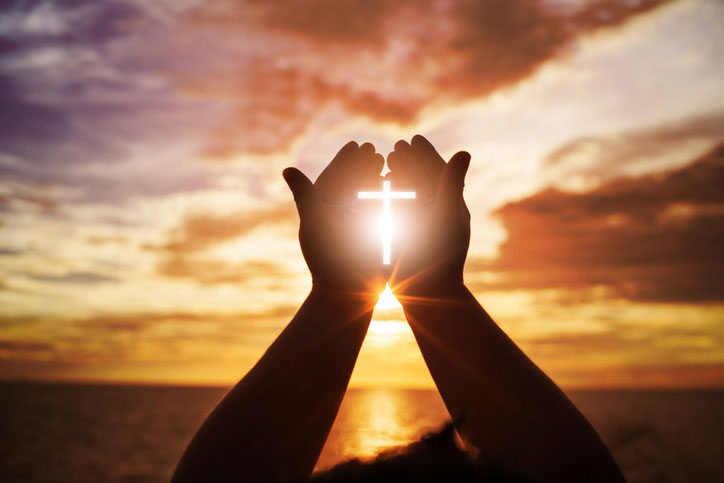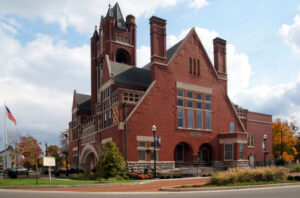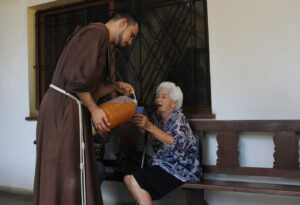
For many pastors, the Master of Divinity degree represents the endpoint of a long path of self-discovery and enlightenment. A calling to the ministry is an absolute call to service.
You did not choose me, but I chose you and appointed you so that you might go and bear fruit—fruit that will last—and so that whatever you ask in my name the Father will give you.
~ John 15:16
For most Christian denominations, becoming ordained as a pastor requires earning a master’s degree. With the souls of an entire congregation in your hands, enormous preparation is required to step into a position of trust and leadership.
Explore a Christian Ministry Degree – Request More Info Today!
Almost overwhelmingly, that preparation means earning a Master of Divinity. As the first professional degree in ministry, it's the overwhelming choice of future ministers and the most common requirement for ordination in American Christian denominations.
According to the Association of Theological Schools (ATS), one of the top accrediting agencies for seminaries and Christian colleges, in 2020 more than 40 percent of ministerial students were pursing the MDiv.
If you're pursuing a position in the ministry, you have a lot of choices for getting that education. There are a wide range of degree programs that could qualify you as a pastor:
- Master of Pastoral Ministry
- Master of Christian Studies
- Master of Arts in Christian Leadership
…and many others.
But there are good reasons that the MDiv has become a juggernaut in the world of ordained ministers:
- Typically at least a year longer than other pastoral master’s programs, packing in more education.
- Offers a dedicated focus on preparation for work in the ministry
- Specialization options tailored to pastoral work
Some denominations accept no substitute for an MDiv when it comes to ordination, and it's easy to see why.
But pursuing a Master of Divinity degree is a significant commitment: in time, in money, in self-examination, in spiritual development. You'll need to absorb as much information you can about what an MDiv will mean for you and how it will serve your calling before you enroll.
What's the Difference Between a Master of Theology vs a Master of Divinity?
A Master of Theology degree is a post-graduate program that is oriented more toward academic preparation and theoretical studies in Christianity than an MDiv. Although a ThM, as they are called, may be used to deepen knowledge and understanding for pastoral practices, the degree is more commonly used as preparation for doctoral studies in theology or as a terminal degree to qualify for teaching in a seminary.
The ThM is usually one to two years in length, and unlike many master’s programs, is designed to be taken after already earning an MDiv or other Christian master’s degree. It is distinct from the Master of Arts in Theology or Theological Studies (MATS), which is a more standard graduate degree offered in both Christian and secular schools to offer academic studies of religion more generally.
Is there a Difference Between a Master of Ministry vs a Master of Divinity?
A Master of Ministry degree can also serve as preparation and qualification for ordination, but is thought of as a more general kind of program. Master of Ministry degrees can come in both academic and professional options:
An academic Master of Ministry will focus on specific theological or research subjects in ministry, such as Biblical languages or Christian history. They prepare graduates for teaching or to enter more advanced degree programs in Christian studies.
A professional Master of Ministry will deliver training in practical pastoral duties such as counseling and evangelism. These programs may also be accepted as qualification for ordination in some denominations, and sometimes have more specialized focus than an MDiv.
Both types of Master of Ministry program are typically between two and three years in length, so offer less coursework than an MDiv even when covering the same subject matter.
What About Associate, Bachelor’s, and Doctorates in Divinity?
 The importance of the Master of Divinity in modern Christian studies is hard to overrate. But you almost never hear about other levels of divinity degrees. In other major professions, there is a pretty clear progression of educational levels… a future economist can earn an associate degree in economics, use it to transfer to a four-year bachelor’s in economics, move up to a master’s in economics, and maybe go on to a PhD in economics at the height of their career.
The importance of the Master of Divinity in modern Christian studies is hard to overrate. But you almost never hear about other levels of divinity degrees. In other major professions, there is a pretty clear progression of educational levels… a future economist can earn an associate degree in economics, use it to transfer to a four-year bachelor’s in economics, move up to a master’s in economics, and maybe go on to a PhD in economics at the height of their career.
Divinity doesn’t work that way for some unique historical reasons.
Undergraduate Divinity Degrees Have Been Replaced By Graduate Studies in Divinity
You can still find associate degrees in divinity at some seminaries and Christian colleges. Although these are uncommon, they offer the type of studies you would expect:
- General studies in liberal arts and sciences
- Old and New Testament studies
- Theology classes
- Evangelical study
- Pastoral ministry preparation
An Associate of Divinity program takes two years and generally prepares you for further college coursework at the bachelor’s level. But that bachelor’s degree will probably be in a field such as pastoral studies or Christian ministry. That’s because…
The Bachelor of Divinity is now almost extinct in the United States.
At one time, a BDiv was all the preparation that you needed in order to become an ordained minister in most denominations. It served the role of first professional degree for the field. And in countries such as England and Ireland, that is still true today. It was possible to graduate from high school and go directly into the ministry through divinity school.
A life in the ministry has always revolved around education. As more and more of the general public earned college degrees, pastors had to keep up in their own schooling.
So, in the 1960’s, seminaries began to require a bachelor’s degree for admission. Since their training was almost entirely professional in nature, revolving around religious studies, it was necessary for candidates to get a basic liberal arts education elsewhere.
Since that made divinity studies post-baccalaureate in nature, it was only natural to classify them as graduate studies. Thus, the BDiv became the MDiv… and there was no longer any role for a Bachelor of Divinity to play in a minister’s education.
Doctor of Divinity Degrees Are Strictly Honorary in the United States
 Just like the BDiv, the legitimate Doctor of Divinity degree is found almost nowhere in American higher education. Instead, post-graduate work in the ministry happens in DMin, or Doctor of Ministry programs.
Just like the BDiv, the legitimate Doctor of Divinity degree is found almost nowhere in American higher education. Instead, post-graduate work in the ministry happens in DMin, or Doctor of Ministry programs.
Why not a Doctor of Divinity, then? Traditionally, doctorates in divinity have been awarded by American colleges as honorary degrees. They've been conferred on illustrious ministers with major stature in the country such as Martin Luther King, Jr. and Jerry Falwell.
Unfortunately, the fact that no real academic accomplishment is needed for a DDiv has led unaccredited schools with dubious reputations to offer the credential. That essentially means that anyone can put in a credit card number on a website and receive an official DDiv certificate in a week or two.
It's always important to the accreditation status of any school you consider for any degree, but you need to be particularly wary with schools in the United States that claim to offer a doctorate in divinity.
Also like the BDiv, however, the Doctor of Divinity remains a legitimate and honorable degree in the United Kingdom and other places.
Master of Divinity Programs Offer a Path to Advanced Knowledge of God's Word and a Career in the Ministry
 Higher education has always been a primary prerequisite for entering the ministry. Indeed, what we think of as the higher education system today has almost entirely evolved from a pattern of instruction that was at first built to train men of the cloth. Harvard and Yale were both founded to train ministers—and both still offer master's degrees in divinity today.
Higher education has always been a primary prerequisite for entering the ministry. Indeed, what we think of as the higher education system today has almost entirely evolved from a pattern of instruction that was at first built to train men of the cloth. Harvard and Yale were both founded to train ministers—and both still offer master's degrees in divinity today.
Originally, all higher education degrees were religious degrees.
As higher education became more secular, it became more specialized. Religious schools and seminaries shifted their training to offer degrees specific to divinity and Christian studies. A four-year bachelor degree in divinity became the standard for ordained ministers in the Western world. Many future pastors would move directly from high school to a four-year seminary program to ordination.
But in about the 1960s, American seminaries began requiring a bachelor's degree for admission. The advanced level of training required for the ministry needed more preparation, and became more focused. That coursework was advanced to the master's level, and became the modern Master of Divinity.
What is a Master of Divinity? … and What Exactly Does Master of Divinity mean?
The Master of Divinity, often shortened to MDiv, is a professional degree of theological study that meets the qualifications that most Christian denominations in the United States require for ordination. Some schools call their program a Master of Arts in Divinity, but there is no real difference in the degrees.
As a professional degree designed to prepare graduates for a unique role in society, the MDiv is on par with the Juris Doctor for lawyers or the Doctor of Medicine degree for doctors—it offers the specialized level of training and hands-on experience required for taking on the responsibility of the ministry.
Explore a Christian Ministry Degree – Request More Info Today!
Master of Divinity Curriculum Offers Rigorous Training in Religious Theory and Practical Ministry
 With that standard course of preparation for ministerial work came a need for great academic rigor. Divinity schools today have an in-depth curriculum that embraces both theoretical religious studies and the very practical kinds of skills that any pastor must rely on to serve their congregation.
With that standard course of preparation for ministerial work came a need for great academic rigor. Divinity schools today have an in-depth curriculum that embraces both theoretical religious studies and the very practical kinds of skills that any pastor must rely on to serve their congregation.
Earning the degree means going through extensive training in at least four content areas outlined by ATS:
- Religious Heritage - The history and tradition of Christian worship
- Cultural Context - The social and cultural systems in which the ministry operates
- Personal and Spiritual Formation - The growth of individual faith and development of the qualities required for pastoral leadership
- Capacity for Ministerial and Public Leadership - Practical theological and liturgical skills training
Every school is free to approach those subjects in their own way and with their own emphasis, however. In fact, different denominations will have their own particular standards for doctrinal teachings that may require specific coursework.
As a practical matter, most MDiv required coursework falls into four general subjects:
Scriptural studies - The Bible is the main manual for living a Christian life and evangelizing God's love and forgiveness. Ministers are expected to know Old and New Testaments chapter and verse. More than that, they are expected to have a deep understanding of the Gospel. It’s quite common to include some language instruction in Latin, Greek, or Hebrew to allow you to experience Scripture in its original form. Most MDiv programs require extensive and detailed coursework in Bible studies through classes such as:
- Hebrew Scripture
- Biblical Hermeneutics
- Psalms and Literature
- Old Testament Greek
History - The history of the church and the foundations of the modern ministry are important subjects for understanding culture and discipleship in today’s world. You’ll approach those subjects through coursework in subjects such as:
- The Historical Development of Christian Theology
- Christian Anthropology
- Church History
Theology - Theology is the study of the nature of God and religious belief. It’s a heavyweight subject in MDiv programs, taking your study of scripture and the historical evaluation of Christian belief and giving you the mental toolkit to interpret, analyze, and draw fundamental conclusions on the nature of worship, morality, and commitment from those sources. Classes in this area might include:
- The Nature of the Trinity
- Social Justice and Moral Life
- Ecclesiology
- Christology
Pastoral Skills - As a professional degree, MDiv programs have an obligation to go beyond theory and train you with the daily skills you will need to perform the practical tasks of the ministry. That means dishing out the basics in Church doctrine, liturgical preaching, musical worship, and Christian counseling. You’ll get there through classes such as:
- Canon Law
- Pastoral Skill in Parish Ministry
- Sacramental Theology
- Ceremony and Leadership
- Evangelical Preaching
- Spiritual Direction
On top of the required coursework, you’ll be free to choose some number of elective courses to help you dive more deeply into areas of particular interest. Unlike many graduate programs, most MDivs do not include a thesis requirement, although they may require a capstone project or writing a senior paper.
You’ll also find that your MDiv studies will be accompanied by many opportunities for internal reflection and personal growth of your relationship with God. A Master of Divinity program is built around the idea that you can be trained in not just the knowledge and skills needed in ministry, but also that your soul may be polished for your service to the Lord.
This may come through counseling and elements that are baked in to your other coursework, or through separate classes in spiritual formation and prayer that are devoted to your own moral and spiritual explorations. In either case, it’s a critical part of how an MDiv prepares you for genuine ministerial leadership.
Practicum and Internships Offer a Taste of Real-world Ministry Practice Before Graduation
To help hone the practical skills of the ministry that you will use most as a pastor, most MDiv programs include either the opportunity or the requirement to participate in hands-on ministerial practice out in the field. That may come through internship opportunities arranged by the school, or through formal fieldwork practicum courses required as part of the degree.
In many cases, you’ll have multiple placements over the course of the program, putting you in different types of ministries to give you a broad range of experience in applied pastoral work. These can include:
- Parish or regional clergy internship positions
- Social services ministries
- Pastoral care of the sick
- Christian counseling placements
That kind of rotation not only helps you develop practical skills from your theoretical and academic training but also gives you a taste of what different paths in the ministry are actually like. It may be a critical piece to your calling that you didn’t know you were missing.
Adding a Specialization to Your MDiv Can Better Prepare You to Follow Your Calling
Beyond the basic approach of a Master of Divinity degree to prepare graduates for a life in ministry, some schools offer a more focused option. These specializations, or concentrations, build on the basic curriculum of that college’s MDiv with focused studies in a particular aspect of the ministry.
These options are a bit like super-charged elective courses. They add a selected array of classes, often with customized field experience placements, to boost your training in the area of specialization. This lets you tailor your degree even more closely to help you fulfill your calling in the ministry.
Some of the most common specialization options are those in:
Bible Studies - Although all ministers are expected to have a strong familiarity with Scripture, those pursuing more advanced studies or deeper understanding can choose a path with more intensive studies, often in the original languages.
Children, Youth, and Family Ministry - Approaching and raising up the next generation of Christians is important work within the church, and it takes specialized skills and an extra helping of empathy and understanding that this specialty helps develop.
Leadership - All pastors are leaders, but some will advance to higher positions in the church, or become more supervisory ministers in very large congregations. This specialization develops organizational and managerial skills for those ministers.
Pastoral Care and Chaplaincy - Counseling, offering comfort, sharing wisdom, and becoming attuned to the needs of individuals or a congregation are all skills that can be cultivated through these concentrations.
Missions - Missionary work is some of the most challenging for any MDiv graduate, but a specialized course of study in the unique challenges of developing and running missions gives you a leg up in the process.
But you can find all kinds of options at different schools, everything from Christian Thought and History to Christian Apologetics.
Specializations are a great opportunity to tune your knowledge and skills to better serve your individual calling in the ministry.
Although specializations offer a great opportunity to tailor your experience through your MDiv studies, they can also increase your course load significantly. Some can require an additional 15 to 25 credits of classes and up to another year of study to complete.
How long does a Master of Divinity take to complete?
A Master of Divinity degree will typically take four years to finish, with around 90 semester credits of coursework to complete. Certain specialization options can increase that to more than 100 semester hours at some schools.
Finding the Right Fit for Your Master of Divinity Degree Seminary Training
You won’t lack for choices when it comes to colleges where you might earn your Master of Divinity.
As of 2020, ATS had accredited a total of 224 schools in the United States, most of which offer MDiv programs.
All are private religious schools, although not all are Christian. Some are aligned with particular faiths, while others may be non- or inter-denominational. Probably the most important factor when it comes to choosing a school for your MDiv will be making sure that the education offered there aligns with the beliefs and doctrine followed by your church.
Because the MDiv is the major degree pursued for ordination, you’ll find counselors at these schools are well-versed in the requirements established by major denominations. They can tell you quickly whether or not the program of study offered at their university will qualify you to become ordained in your particular faith.
What is a Seminary?
 You probably noticed when you started looking into Master of Divinity degrees that many of the colleges that offer them are called seminaries, or divinity schools. What makes those different from any other type of Christian university?
You probably noticed when you started looking into Master of Divinity degrees that many of the colleges that offer them are called seminaries, or divinity schools. What makes those different from any other type of Christian university?
Seminaries are schools that are devoted to an education in divinity. Today, they exist almost exclusively at the graduate level in the United States. Unlike many Christian universities, which offer a broad range of majors, seminaries focus solely on theological and pastoral degree programs.
Originally, since universities were mostly founded as institutes designed to prepare students for the priesthood, no distinction was necessary. But as secular education became more common, divinity programs began to establish themselves as distinct from other higher education programs. Harvard, for example, spun off Harvard Divinity School as a constituent school of the University in 1816, creating the first non-denominational school of divinity in the country.
But many other denominations had already created their own theological seminaries by that time. Until the 1960s, however, the course of study paralleled a bachelor’s level program from a secular university. Only when divinity became a master’s level course of study did seminaries advance into graduate-level courses of education.
Earning an MDiv today won’t be substantially different whether from a seminary or a Christian university. Both cover the same coursework and spiritual formation and are equally recognized for purposes of ordination.
The Importance of Accreditation in Selecting a Master of Divinity Program
You might have noticed we have referred to the Association of Theological Schools, or ATS, quite a bit as we’ve talked about standards and quality in MDiv programs. That’s because accreditation is how those standards are set—ATS, or other accreditors who are recognized by the Council for Higher Education Accreditation or the Department of Education, evaluate schools for academic and administrative qualities in line with what the ecclesiastical community expects of a divinity education.
So it’s important to select an MDiv program that has been recognized by such an accreditor to ensure you are getting the education you are paying for. More importantly, it helps ensure that education is one that your church’s ordination process will accept.
A Worthy Application Helps Ensure You Get Accepted to Divinity Schools
 Although there are a lot of Master of Divinity programs out there to choose from, there is also plenty of demand for spots in those programs.
Although there are a lot of Master of Divinity programs out there to choose from, there is also plenty of demand for spots in those programs.
The National Center for Education Statistics found that about 12,600 graduate degrees in theology or religious vocations were conferred in 2020. To put it in perspective, that’s about as many master’s degrees as are awarded in mathematics and statistics, and more than are earned in law or journalism.
According to ATS, more than 30,000 students were enrolled in MDiv programs at member schools in 2020.
So you have some hurdles to clear in order to become accepted to a Master of Divinity program. For most schools, the basic requirements are the same:
- Hold a bachelor’s degree or equivalent with a certain minimum grade point average (pastoral or Christian studies usually preferred; some schools have a set number of credits you must have completed in religious coursework)
- Take and present scores from GRE (Graduate Record Exam) or MAT (Miller Analogy Test) or other graduate school entrance examination
- Complete a questionnaire or file a statement of beliefs with the school
- Provide one or more letters of recommendation, typically including a pastoral recommendation
Other schools may adopt even stricter requirements, specifying undergraduate coursework in philosophy or theology, requiring statements of support from your faith community, or meeting other standards for ordination as laid out by your particular faith.
A solid history of participation and attendance at your own church can also give you a boost in your application to divinity school. Volunteering with faith-based organizations or in evangelical efforts or missions is always a mark in your favor. And you should be ready to offer your personal testimony and articulate your calling either in an interview or essay.
Are There Advantages To Earning a Master of Divinity Online?
 Online master of divinity degree programs are becoming more and common in Christian college and seminary education. That was true even before COVID-19 pushed more and more schools into online training. But today, accredited master of divinity degrees online have jumped up the list of programs to consider for reasons far beyond just expediency.
Online master of divinity degree programs are becoming more and common in Christian college and seminary education. That was true even before COVID-19 pushed more and more schools into online training. But today, accredited master of divinity degrees online have jumped up the list of programs to consider for reasons far beyond just expediency.
Technology has advanced to the point where you won’t have any problem immersing yourself in the intricacies of Hebraic lateral fricatives through a video streamed by your professor from half the continent away. The remote learning experience has become just as conducive to absorbing class material as traditional courses.
What online learning really brings to the MDiv experience is freedom and flexibility. With asynchronous classes, you can study, replay, and take in that Hebrew phonology on your own time, as often as you like, whenever it is convenient.
That opens up the MDiv experience to many students who might never be able to attend a traditional on campus program. At the master’s level, many students already have regular jobs and family obligations to meet. Regular classes don’t necessarily fit in with how life unfolds for most adults.
Your calling may require sacrifice, but it will never demand the impossible. Online programs offer options that make it possible for students of all ages and with heavy obligations to pursue the ministry.
By making colleges across the country available for your studies, without requiring the commitment of picking up and moving to meet them, you have better odds of finding the right fit, and finishing your degree on your own schedule, than ever before.
Explore a Christian Ministry Degree – Request More Info Today!
The Benefits of a Master of Divinity Are Big, But So Are the Costs
A Master of Divinity program offers the best possible training for ordination. It’s a lengthy, comprehensive, advanced course of training in everything that makes a minister a minister. But all that education comes with a significant cost.
The average annual cost for tuition and fees for graduate programs in the United States for 2020 was $19,792 per year according to the National Center for Education Statistics (NCES).
Divinity schools are all private, so it's important to take that into consideration while planning to finance your education. NCES also tracks data independently for private schools. Tuition and fees in those institutions rise to $26,500 each year.
The math is easy to do: for a four-year Master of Divinity program, your costs could well rise above $100,000. And that’s before considering other living expenses.
Covering the Cost of Your Master of Divinity Through Loans and Scholarships
If you’re being called to the ministry, then He will provide you a way to pay for the education that calling requires.
But that doesn’t necessarily mean that path is going to be an easy one. You are still going to have to fill out a lot of paperwork along the way!
That’s because divinity students of modest means largely have to rely on scholarships and student loans in order to pay their way through an MDiv program.
Scholarships are usually the first choice. These grants do not need to be paid back, assuming you complete your studies, and they are generously offered by both seminaries themselves and by other Christian organizations and churches that encourage divinity training. You will typically apply for a score or more of these, all of which might have different requirements for the type of coursework you will pursue, a grade point average you must maintain, and may even only be available based on your race or where you are from.
Scholarship grants don’t usually pay all the costs of attendance for MDiv degrees. Most divinity students will also take out student loans to cover the gaps.
Such loans offered by the federal government typically come with the most generous terms:
- Low interest rates
- No payments required while still in school
- Long repayment schedules
But there are also lifetime limits on those loans, which you may have hit attending your undergraduate institution.
Private lenders are also available for student loans, but you have to be wary of interest rates and repayment terms considering you are likely to be servicing them out of a modest minister’s salary.
A Master of Divinity Gives You Access to Limitless Careers Doing God’s Work
 Most of the people who are called to pursue a Master of Divinity will do so with the expectation of becoming ordained and serving as a pastor or minister in any of the varied positions available in such a position. Everything from serving as a minister in a small rural community to becoming a pastor in a vast urban megachurch to going on a multi-year mission in rural Africa is on the table.
Most of the people who are called to pursue a Master of Divinity will do so with the expectation of becoming ordained and serving as a pastor or minister in any of the varied positions available in such a position. Everything from serving as a minister in a small rural community to becoming a pastor in a vast urban megachurch to going on a multi-year mission in rural Africa is on the table.
The range of specializations with the pastoral role are breathtaking, and you are probably already familiar with many of them:
- Associate pastors for large congregations, specializing in:
- Youth and Family
- Men’s Ministry
- Worship Ministry
- …and many more
- Missionary and evangelist ministries
- Solo pastors for small parishes
- Chaplains in…
- Military service
- Police and fire departments
- Sports teams
But an MDiv opens up many non-pastoral Christian jobs as well.
Your training in counseling work, the wisdom you develop in Scriptural and philosophical studies, and the broad understanding of both the frailty and heart of humankind will serve you well in any social justice or faith-based initiative.
Becoming a Christian Educator is a Natural Fit if You Hold a Master of Divinity
Education is a natural place for Master of Divinity graduates to wind. A master’s degree gives you an expansive base of knowledge to work from; the communications skills that come along with it make you a good fit for teaching or other positions of scholarship.
MDiv graduates may return to the seminary as professors themselves after going on to do doctoral work, educating the next generation of divinity students. You may teach in any subject but with the particular perspective on faith and with the compassion and understanding that truly makes teachers excellent.
Though it's possible to become an instructor with an MDiv alone, getting a job teaching at a seminary without a PhD is increasingly becoming a thing of the past. Seminary jobs can be quite competitive, so it's wise to plan for a doctoral degree if teaching is your life's ambition.
Careers in Social Work Can Be Powered to New Heights with an MDiv
Clergy have long been at the forefront of community organizing and advocacy for social justice. MDiv graduates drive forward civil rights, build drug rehabilitation non-profits, and bring light and hope to inner-city youth beset by crime and poverty. A master’s-level education gives you powerful tools to accomplish the Lord’s work in this world.
- If your passion for service leads you to speak for immigration reform and assist migrants, an MDiv will equip you with the speaking and organizing skills to do that.
- If you are moved to help with the plight of the homeless, you will take with you the compassion and the leadership skills to do that.
- If global hunger and food insecurity disturbs you, you’ll have the kind of moral authority and inspirational skills to help rally solutions from governments and private industry to those problems.
Divinity Graduates Benefit Any Organization Working in the Interest of the Community
 Although faith-based organizations are the most natural fit for MDiv graduates, there are plenty of secular organizations that can benefit from the advanced training your degree will give you. All kinds of non-profits need the drive and expertise in their leadership that an MDiv brings with it. Governments consult with religious experts on social policy and public relations. Major corporations benefit from the religious perspective on everything from new products to major business initiatives.
Although faith-based organizations are the most natural fit for MDiv graduates, there are plenty of secular organizations that can benefit from the advanced training your degree will give you. All kinds of non-profits need the drive and expertise in their leadership that an MDiv brings with it. Governments consult with religious experts on social policy and public relations. Major corporations benefit from the religious perspective on everything from new products to major business initiatives.
In the end, a Master of Divinity is just another tool, one that God has given you to fulfill your call to service. But it's among the most powerful tools available to clergy in today's world, and well worth your devotion and investment in God's service.
Explore a Christian Ministry Degree – Request More Info Today!








